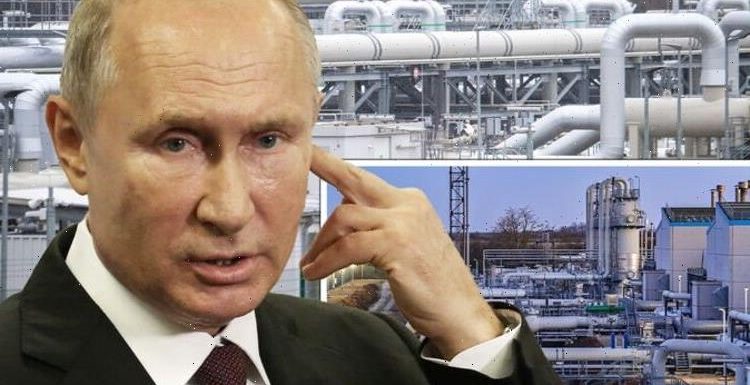
Boris Johnson outlines plan to phase out Russian oil and gas
We use your sign-up to provide content in ways you’ve consented to and to improve our understanding of you. This may include adverts from us and 3rd parties based on our understanding. You can unsubscribe at any time. More info
Energy bills across the UK are soaring at present thanks to rising wholesale gas prices driven by a perfect storm of exacerbating factors. These include increasing demand, a relatively poor summer for wind energy and the invasion of Ukraine by Russia, the world’s largest exporter of liquified natural gas. Under April’s new price cap, the average household energy bill will rise by £500 due to gas prices alone, with a further £68 coming from supplier collapses.
At present, the UK meets around four percent of its gas demand directly from Russia — an expenditure equivalent to £6million per day under recent wholesale fuel prices – and indirectly imports far more.
Analysis from the Energy & Climate Intelligence Unit (ECIU) has revealed that the Government’s plans to save energy by rolling out electric heat pumps and insulating more homes could cut out Russian gas faster than the proposed expansion of North Sea drilling.
Heat pumps, which work like a reverse fridge, bringing in heat from the outside, come with high initial costs but can save households money over time thanks to their energy efficiency.
Experts have predicted heat pumps will be on average £260 a year cheaper to run than gas boilers from April onwards, with the UK Government offering £5,000–£6,000 to help households switch over as part of their Boiler Upgrade Scheme.
According to ECIU experts, only by using less gas overall can UK households lock in lower energy bills, as the price of gas, whether from Russia or the North Sea, is set by international markets.
Plans to install insulation and heat pumps in 6.5 million homes could cut out the UK’s need for Russian gas by 2027, they calculated.
Proposals to expand drilling efforts in the North Sea gas and oil fields, meanwhile, wouldn’t come fully online until the year after — and also would cut household costs, the ECIU said.


ECIU head of analysis Dr Simon Cran-McGreehin said: “The net zero path leads us to common sense home insulation and clean, renewable, homegrown energy.”
Such measures, he added, would allow Britain “to cut dependence on other countries like Russia for gas and oil.
“It’s a permanent solution and the UK needs to embrace it with greater urgency if we want to be truly energy secure.”
According to a survey of 2,000 UK adults recently commissioned by the ECIU, 57 percent of the public believe that eschewing gas altogether in favour of renewable energy represents the best way of eliminating our dependence on Russian gas.
In contrast, only 29 percent of respondents believe that the answer lies in increasing the UK’s domestic gas supplies by means of expanding drilling and fracking.


Dr Jan Rosenow of the Regulatory Assistance Project — an independent, non-partisan group dedicated to accelerating the transition to a clean, reliable, and efficient energy future — said: “A massive scaling up of energy efficiency and heat pumps are the obvious response to sky-high gas prices and the dependency on gas.
“The Government’s targets are ambitious but not ambitious enough.
“We could go faster and further as the Committee on Climate Change has shown time and time again, and get ourselves off Russian gas well before 2027.”
According to the ECIU, if enough UK homes were upgraded with insulation and other energy efficiency measures that the average energy performance certificate (EPC) rating moved from band D to the Government’s target of band C, the average household would use 20 percent less gas.
This would lead to the UK’s overall gas demand falling by more than eight percent — double that which we presently source directly from Russia — while gas imports could be reduced by 15 percent.
DON’T MISS:
Putin goes dirty as weapon that can vaporise bodies used in Ukraine [ANALYSIS]
Truss to the rescue as she pushes UK to cut ALL Russian energy [REPORT]
UK faces ‘no threat’ from Russia thanks to ‘secure’ Norway gas supply [INSIGHT]

Former Secretary of State for Business, Energy and Industrial Strategy Andrea Leadsom acknowledged that various paths forward present themselves.
She said: “Short term energy measures like better, warmer homes, investing in heat pumps, and increasing our use of offshore wind and the capacity of the North Sea oil basin can help the current energy situation that we are experiencing.
“I am confident that these, and other options, will be on the table as the Government seeks to strengthen our energy security.”
Regardless of the approach taken, she concluded: “It’s clear that Putin cannot be allowed to continue to wield the weapon of gas prices over us.”
Source: Read Full Article